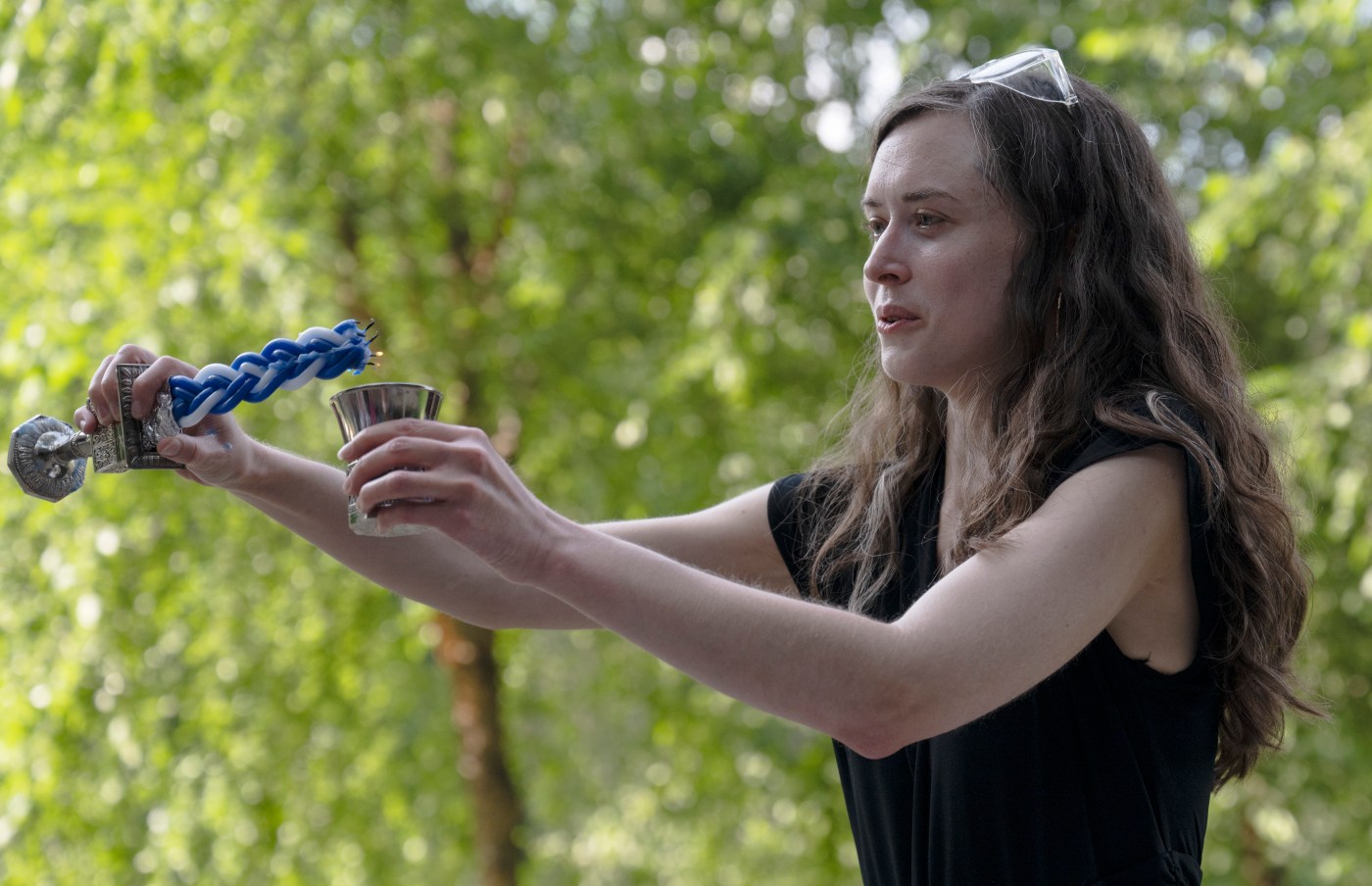
Q&A: Minnesota’s first Humanistic rabbi on God, justice and human responsibility
This form of Judaism doesn’t worship a God.
It’s called Humanistic Judaism, and it was founded by Rabbi Sherwin Wine in the Detroit area in 1963. The Judaism practice, which is grounded on solidarity, made its way to Minnesota in the 1980s.
“Rabbi Wine, who started the Society for Humanistic Judaism, spent a weekend at the First Unitarian Society as a principal guest lecturer talking about Humanistic Judaism. And that’s what really kicked off our congregation,” recounted Joan Barnette, one of the founding members of Or Emet.
The Or Emet congregation, which is the only one of its kind in Minnesota, has existed since the 1980s. It is among about 30 such congregations in North America. One of its members, 37-year-old Eva Rose Cohen, grew up practicing in the congregation, taught at their school and more recently served as their ritual leader. She was ordained as their first rabbi in May.
Cohen is a St. Paul native who graduated from Central High School. She, her husband and their 4½-year-old daughter reside in Minneapolis’ Seward neighborhood.
The Pioneer Press met with Cohen and her congregation at a picnic at St. Paul’s Crosby Farm Regional Park on a recent warm Saturday afternoon for a ceremony to transition out of Shabbat, called a Havdalah. Cohen’s responses were edited for clarity.
Q: Why did you decide to become a rabbi?
A: I think it was more like I was a member and I stepped into leadership when no one else was necessarily available or interested. More like an ongoing conversation between me and the community, me choosing the community and the community choosing me. And it was working, and I think people were excited about it. I’m happy that I can be here to serve this community as it’s been growing.
Q: What is Humanistic Judaism?
A: The Humanistic Jewish movement started in the 1960s. Rabbi Wine’s training was as a reform rabbi, and he was leading a congregation of people that started as a reform congregation. But more and more of the members were recognizing that they were not aligning with a theistic worldview, and that was his feeling as well. The synagogue he led moved to create a new kind of Jewish liturgy and approach that really focused on human power and human responsibility to make a difference in the world.
The Torah sets forth the expectation that people will have no other gods before the God of the Torah, and that they would worship that God who is mostly framed as masculine, powerful, in a lot of contexts, angry.
I personally identify as an atheist and have identified this way since childhood. That’s not true of all humanists or Humanistic Jews. Some are atheist, some are agnostic, some use the term “ignostic,” some believe in a Spinoza God some believe in a Spinoza God (a God that expresses themselves as an infinite number of attributes). We can’t prove or disprove God’s existence, but for me, there is a preponderance of evidence that suggests that there is not a God. I identify as a Humanistic Jew because God’s existence or lack of existence is not all that relevant to me. The things that matter to me is a belief in people’s power to improve things. We’re not calling on God to make things better for us, we’re committed to acting for ourselves.
Q: What do you find meaningful about Humanistic Judaism?
A: Jewish tradition inspires me as a tradition that places a strong emphasis on social justice, in part connected to the long history of Jewish people experiencing oppression and discrimination. I’m also inspired by Jewish tradition’s connections to the cycle of the seasons, as well as fun and meaningful holidays that connect us to our natural world, each other, and the things that we value in our history and culture.
Rabbi Eva Cohen extinguishes a braided candle into a cup of grape juice at the conclusion of a Havdalah service for the Or Emet congregation during a picnic at Crosby Farm Regional Park in St. Paul on Saturday, July 27, 2024. Or Emet, Hebrew for Light of Truth, is a Twin Cities-based Humanistic Judaism congregation for secular Jews and others that celebrates Jewish culture and history. Havdalah is a Jewish ceremony marking the end of Shabbat. (John Autey / Pioneer Press)
I appreciate that Humanistic Judaism draws on all those things I find meaningful and valuable in Jewish tradition while removing the theistic and patriarchal and xenophobic parts that I reject, and making it really oriented around human power and responsibility to make a positive difference in the world. It is inclusive and welcoming to people of all backgrounds and particularly suitable for those who want to connect with Jewish tradition and connection that is human-based and not God-based.
There’s a long tradition of other secular Jewish movements which have all added valuable and important things to Jewish culture and the broader conversation. What I think is unique about our religion in comparison to other secular Jewish movements is that we’re organizing our activities in community life around a synagogue model. In some ways, we have that continuity with the religious strand: we have services, we are a congregation, and I think there is a lot of benefit that comes with that model in terms of the way that it builds community and provides meaningful ritual structure to bring that community together.
Q: What is the ordination process like?
A: For me, the process took seven and a half years. The International Institute for Secular Humanistic Judaism ordains rabbis for our movement. If it were offered as a full-time rabbinical program, it would be a four-year program. But the classes are offered usually one at a time. And it’s mostly distance learning because it’s a small program with people around North America. And it would be weekly seminars, we’d meet on Zoom and then some summer courses that were in-person intensives.
When I entered my program, I was a medical actor and patient educator and a trainer for other medical actors. I was continuing to do some artwork professionally that I started in my program and I was still teaching at Or Emet school, our Jewish cultural Sunday school, and I had been working as the school’s director, which I finished in 2017. I was also taking on more leadership roles, and in 2020 I became the congregation’s ritual leader, where I was doing the job of a rabbi while I was still in training.
As part of the program requirements, I also had to get a master’s degree in Jewish Studies at another institution. So I got a master’s degree in Classical and Near Eastern Studies with a focus on the Hebrew Bible in the Ancient Near-East at the University of Minnesota-Twin Cities. And I also had a kid during that time and the pandemic. Basically, it took awhile.
Q: How was the congregation able to persist without a rabbi?
A: Organized Jewish life doesn’t have to be rabbi-centered. If you have an active and engaged group of members who are excited about celebrating Jewish culture and working together to put on events and create meaningful tools and other kinds of things — Or Emet has such wonderful and strong lay leadership, and volunteer involvement is one of the strengths of the congregation. But as it’s continued to grow, and more and more people with more and more different kinds of wants and needs, there’s certainly interest in seeing how we could do things on a larger scale with more nuanced approaches, with a rabbi at the helm.
Q: What do you do outside of preaching and how do you integrate that with your practice?
A: Right now, this is kind of my primary focus. It’s part time just because the congregation is small. I do some work as a medical actor, and I do some related work as a patient educator, helping to train medical students and nursing students. And then I have a 4½-year-old; my husband and I share child care responsibilities.
In the past, I would do posters and album work for bands. I did some comic stuff. Probably the thing that got the most attention, I did a little comic series for MN Artists back in 2016, kind of like, life of the artist, slice of life kind of thing.
I love to cook Jewish food, read Jewish books, celebrate Jewish holidays, share that with my family. Enjoy Jewish humor, comedians, jokes, Jewish music, all of that. And then, in terms of the Humanistic Jewish commitment to trying our best to improve ourselves and improve our world, with the understanding that there is no supernatural power that’s going to be intervening. I’m trying to do my own part to make a positive difference in the world in terms of being involved in political and social justice work in the capacity that I have.
Q: What are your thoughts on what is happening in Gaza?
A: Speaking from a congregational perspective, in my role as Or Emet’s rabbi, myself and all of my congregants want a peaceful and just solution for all Israelis, for all Palestinians, for everyone in Israel, for everyone in Gaza. The way things are going right now is not conducive to either of those things. Different Jewish people, even different Humanistic Jews, have different understandings of the peace and justice policy solutions that would be appropriate. But from a Humanistic Jewish perspective, we affirm the full humanity and human dignity of people on all sides of the conflict, and we do not endorse or support any kind of action that is dehumanizing and is threatening human safety.
Related Articles
Q&A: Suzanne Kelly, new CEO of Minnesota Council of Churches, wants to build a faith community ‘that makes people feel whole’
Kamala Harris: A Baptist with a Jewish husband and a faith that traces back to MLK and Gandhi
Hamline University settles lawsuit over showing of Prophet Muhammad in art history class
Former St. Anthony bank being converted to mosque vandalized or broken into 7 times in two months
Noah Feldman: The Supreme Court’s religious crusade found its soldiers

